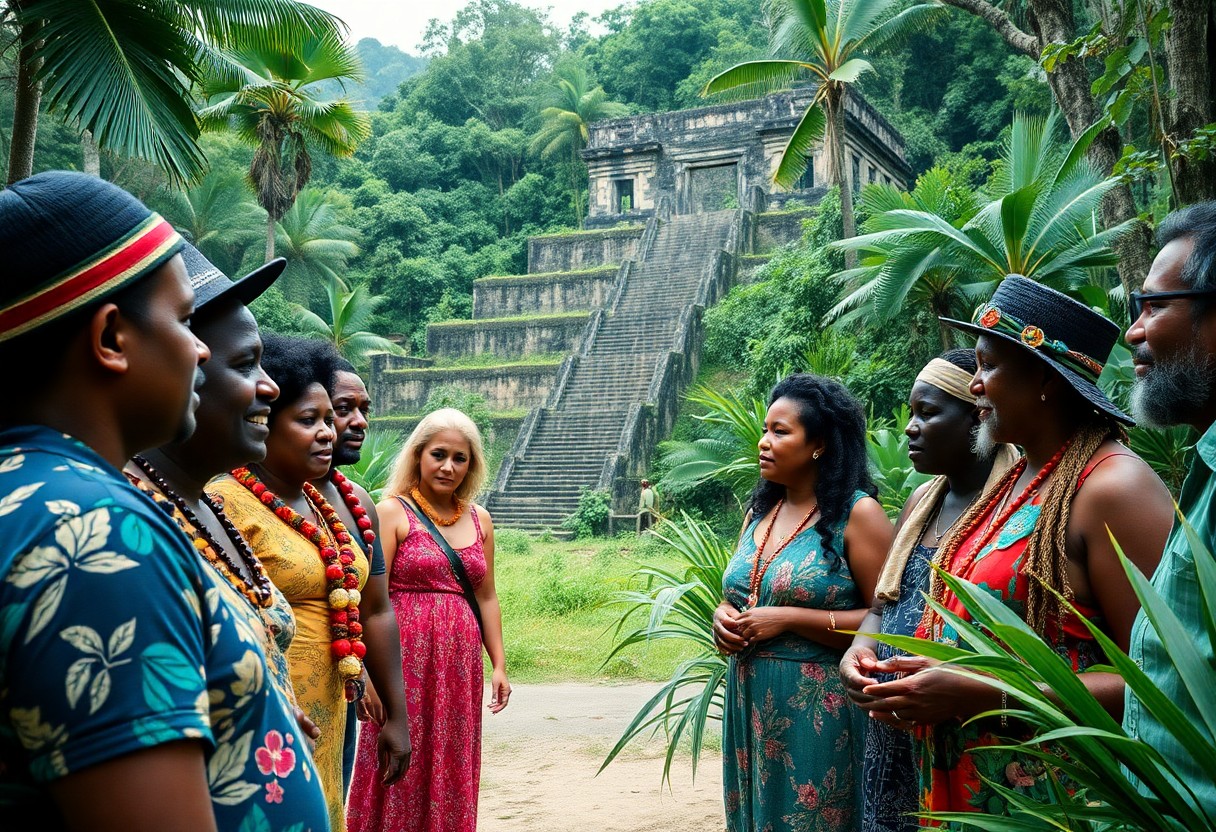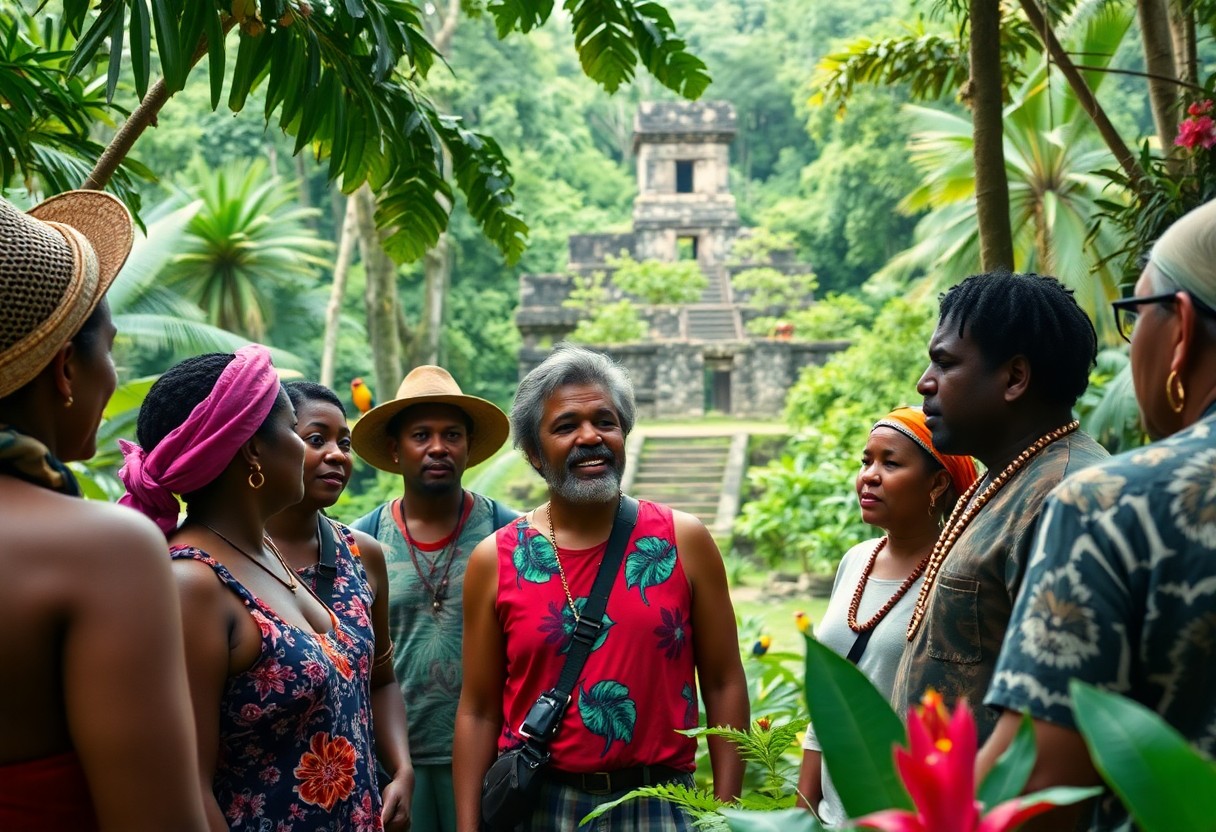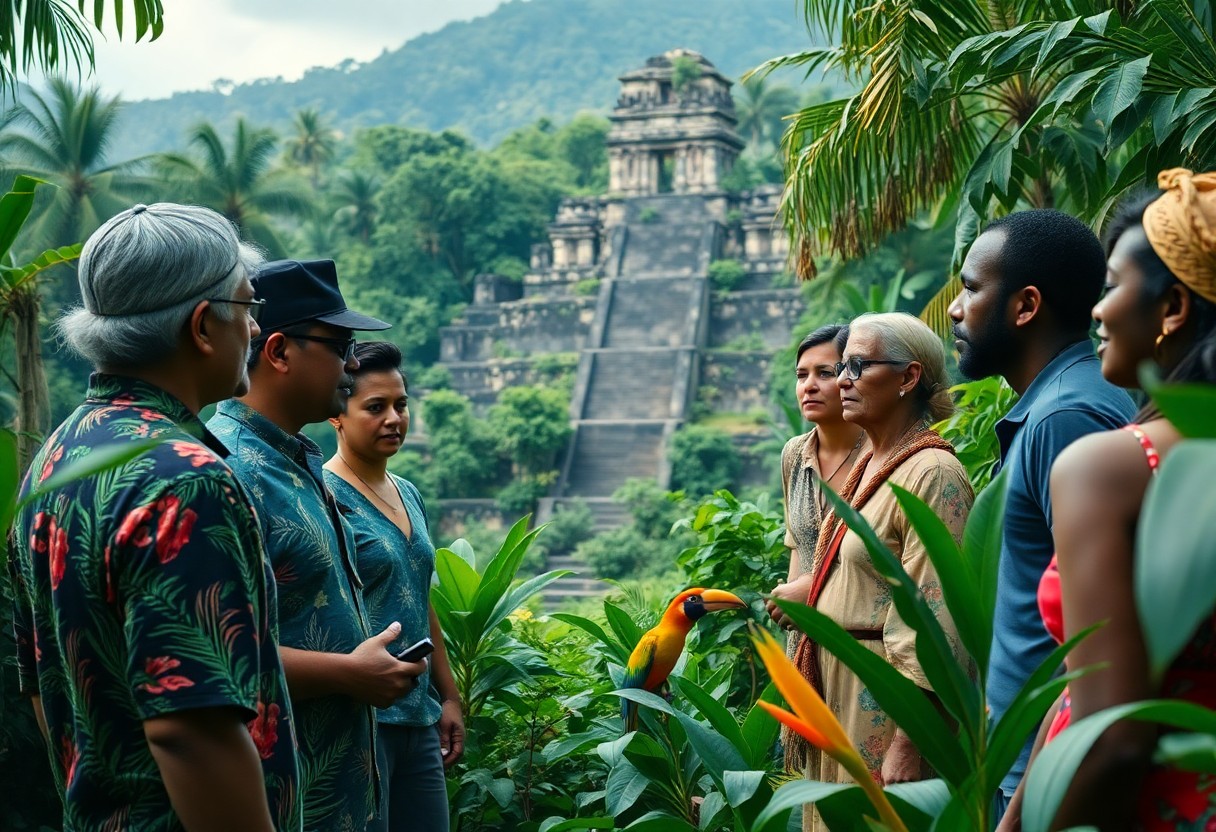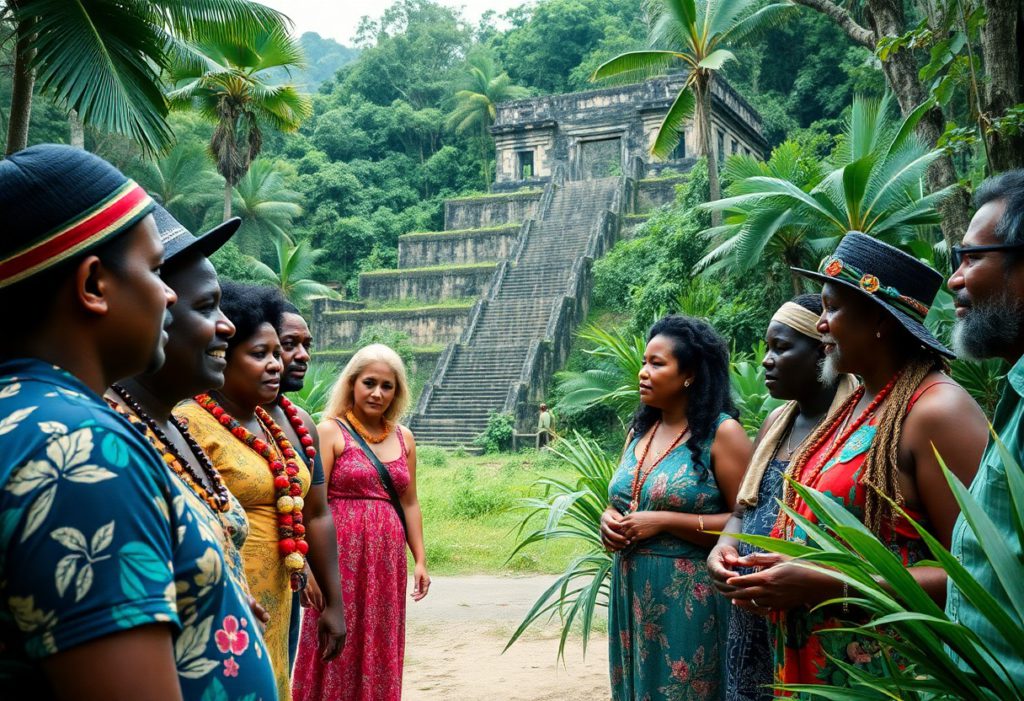Throughout the years, Belize has established itself as a remarkable travel destination, captivating visitors with its exceptional blend of cultural richness and breathtaking natural attractions. This stunning nation invites you to experience a land where English is the official language, yet a vibrant array of languages, including Creole, Spanish, and Mayan, reflects its dynamic cultural fabric. As you embark on this journey, you will uncover a captivating historical tapestry that narrates the legacy of ancient Mayan civilizations, the enduring effects of British colonialism, and a lively modern identity. Moreover, the ecological diversity of Belize is astonishing, showcasing unique ecosystems like the world’s second-largest barrier reef and verdant tropical rainforests filled with endangered species. With its distinctive linguistic diversity and remarkable environmental wonders, Belize promises an unmatched adventure, offering an extraordinary experience in Central America.
Dive into Belize's Language Diversity: A Multilingual Adventure
Belize is characterized by its intriguing tapestry of linguistic diversity, presenting a multilingual landscape that beautifully mirrors its rich cultural heritage. This nation is home to a unique mix of languages coexisting harmoniously, enhancing communication and creating an exciting, dynamic atmosphere throughout this vibrant Central American country. This linguistic variety enhances social interactions and enriches Belize's cultural fabric, inviting you to engage with local communities and discover their unique stories, traditions, and ways of life.
Discover the Significance of English in Belizean Culture
The cornerstone of Belize’s linguistic diversity is English as the official language, a heritage that traces back to its colonial past under British rule. You will find English widely utilized in government, education, and the media, acting as a unifying medium that connects the diverse population. This widespread adoption of English not only facilitates communication among various ethnic groups but also fosters a shared understanding, promoting a sense of national identity that bridges cultural divides. The prominence of English in Belize significantly enhances its attractiveness as a travel destination, making it easily accessible for international visitors seeking to explore this captivating nation.
Exploring the Role of Spanish in Belize's Cultural Identity
The linguistic landscape in Belize is enriched by the presence of Spanish, primarily spoken by Hispanic communities and immigrants from nearby countries. You will notice significant populations of Spanish speakers, especially in border areas and urban centers, where cultural interactions flourish. As the second most prevalent language in the country, Spanish serves as a vital link connecting Belize to its Central American neighbors, facilitating cultural exchanges and cross-border interactions. This linguistic presence enhances the cultural richness of Belize, allowing for a vibrant blend of traditions and practices that reflect the region's historical ties and shared heritage.
Understanding the Unique Characteristics of Belizean Creole
Belizean Kriol, or Spanish Creole, exemplifies a distinct linguistic fusion that permeates the country. This language has developed through historical interactions between African and European populations, capturing the essence of Belize's multicultural legacy. For many Belizeans, Creole serves as a primary means of communication, embodying the dynamic cultural exchanges that define the nation. It is a lively and expressive language that reflects the rich historical narratives and experiences of the diverse communities inhabiting Belize, making it an integral part of the country's identity.
Exploring the Rich Heritage of the Garifuna Language and Culture
Diving deeper into Belize's linguistic landscape, Garifuna emerges as a remarkable language community. This Arawakan language is spoken predominantly by indigenous populations along the southern coastal areas. Garifuna holds immense cultural significance, embodying the resilience and heritage of Afro-indigenous communities. You will discover how this language serves to preserve unique traditions, songs, and historical narratives, further enriching the vibrant cultural mosaic of Belize. The cultural expressions of the Garifuna people, including their music and dance, significantly enhance the nation’s diverse offerings and provide insight into their rich heritage.

Understanding Belize's Colonial History and Journey to Independence
Belize's colonial history weaves a complex narrative influenced by European interventions and indigenous resilience. Initially claimed by Spain, the region came under substantial control by British settlers, who established logging settlements that transformed the territory into a strategic outpost. These British colonizers laid the groundwork for economic systems centered around wood extraction, ultimately leading to the formal designation of British Honduras as a colony in 1862. This historical backdrop provides essential insight into the socio-political dynamics that have shaped contemporary Belize.
Examining the Historical Context of British Honduras
During its era as British Honduras, Belize experienced a unique confluence of cultural interactions that significantly influenced its identity. You would observe the coexistence of British settlers alongside Maya populations, descendants of African slaves, and various ethnic groups, each contributing to the rich tapestry of Belizean society. The colonial period was marked by significant demographic shifts, as economic activities transitioned from logging to agricultural production, culminating in a diverse social landscape. This remarkable historical narrative deepens your understanding of modern Belizean identity, reflecting the influences of various cultural stories and traditions that coexist within the nation.
Tracing the Path to Belizean Independence
The political movements of the mid-20th century characterized Belize's journey to independence, marked by diplomatic negotiations and regional tensions. You will appreciate how influential political leaders like George Price skillfully navigated complex international relationships, particularly with Guatemala, which has laid territorial claims on Belizean land. The road to independence was fraught with challenges, requiring negotiations with both the British government and neighboring countries. The achievement of independence on September 21, 1981, represented a peaceful transition from over a century of British colonial rule, underscoring the strategic diplomacy and national determination that defined Belize's emergence as a sovereign nation.

Exploring the Extraordinary Ecosystems and Biodiversity of Belize
In Belize, nature offers an astonishing spectrum of ecological diversity that is unparalleled anywhere else globally. The country’s geographical position creates a unique intersection of ecosystems, ranging from coastal marine environments to lush tropical forests. You will discover landscapes that seamlessly blend Caribbean marine habitats with verdant inland terrains, presenting a stunning ecological experience that establishes Belize as a global hotspot for biodiversity. This distinctive combination of environments invites exploration and appreciation of nature’s intricate beauty, making it a paradise for nature enthusiasts and eco-travelers alike.
Uncover the Wonders of Belize's Coral Reefs
As you traverse Belize’s coastline, you will be awestruck by the world’s second-largest barrier reef system, extending approximately 300 kilometers. This magnificent marine ecosystem boasts a vast array of coral formations, providing vital habitats for thousands of marine species. Your underwater explorations will reveal vibrant coral gardens, intricate underwater landscapes, and a rich marine environment that supports both ecological balance and stunning visual diversity. Preserving this reef system is crucial for maintaining marine health and promoting sustainable tourism practices, ensuring that future generations can enjoy its beauty.
Immerse Yourself in the Lush Tropical Rainforests
Covering nearly 60% of Belize’s landmass, the tropical rainforests are a core component of the country's ecological identity. As you venture into these lush, green landscapes, you will encounter an astonishing diversity of plant and animal life. These forests play a vital role in the ecosystem, serving as a sanctuary for numerous endangered species while contributing to essential environmental processes. To fully appreciate Belize’s rainforests, it is crucial to understand their complex ecological structure. These multilayered ecosystems encompass a variety of vegetation layers, from the forest floor to the towering canopy above. You will uncover intricate interrelationships between plants, insects, mammals, and microorganisms, illustrating the delicate balance of life that rainforests maintain, which is essential for climate regulation and resource provision.
Discovering Belize's Remarkable Wildlife Biodiversity
The convergence of reefs and forests creates an extraordinary wildlife sanctuary where you will encounter an impressive array of species diversity. Belize is home to over 500 bird species, numerous mammals, and a wide variety of reptiles and amphibians. Your journey through these diverse ecosystems will reveal a living tapestry of biodiversity. However, Belize’s wildlife represents more than just a count of species; these ecosystems are crucial to global conservation initiatives. You will find endangered species like jaguars, howler monkeys, and marine mammals thriving within these protected environments. The intricate balance of predator-prey relationships, migration patterns, and habitat preservation positions Belize as a global leader in ecological conservation and biodiversity management.

Celebrating the Cultural Mosaic of Belize
Despite its modest size, Belize boasts a dynamic tapestry of ethnic diversity, showcasing a remarkable fusion of cultures, including Creole, Garifuna, Maya, Mestizo, and European descendants. You can delve into a society characterized by the coexistence of multiple languages and the intermingling of traditions, creating a unique national identity that celebrates differences while promoting social harmony. This multicultural landscape offers you an extraordinary opportunity to witness how diverse communities can thrive together, enriching the national narrative and enhancing the overall cultural wealth of Belize.
Participating in Vibrant Multicultural Festivals
Any visitor to Belize will find themselves enchanted by the colorful and lively festivals that showcase the nation’s rich cultural heritage. You’ll partake in celebrations such as Garifuna Settlement Day, where traditional music, dance, and historical reenactments unite communities in a spectacular display of cultural pride and solidarity. These festivals not only provide entertainment but also serve as essential platforms for preserving cultural traditions, allowing both locals and tourists to engage with Belize's vibrant and dynamic cultural identity.
Indulging in the Flavors of Belizean Cuisine
The culinary landscape of Belize reflects its multicultural roots, offering you a delicious fusion of flavors that draws upon various ethnic traditions. You will encounter dishes that blend Maya, Creole, Caribbean, and Central American influences, creating a unique gastronomic experience that tantalizes the palate. A deeper exploration of Belizean cuisine unveils extraordinary culinary practices that are truly unique. You’ll discover local delicacies like gibnut (a game meat), rice and beans paired with stewed chicken, and a plethora of seafood specialties that highlight the country's diverse cultural influences. Each dish tells a story of migration, adaptation, and cultural exchange, adding depth and richness to your culinary exploration.
Experiencing the Vibrant Sounds of Belizean Music
Above all, Belizean music stands out as a dynamically evolving expression of cultural fusion. You’ll encounter a range of rhythms that blend Caribbean, African, and Latin American influences, creating a distinctive soundscape that reflects the nation’s diverse heritage. For instance, the rich musical traditions of Belize include genres such as Punta, Brukdown, and Reggae. These musical styles not only provide enjoyment but also play a significant role in preserving cultural memories and narratives, serving as powerful mediums for cultural expression and identity in Belize.
Unveiling Belize's Tourism Attractions and Natural Marvels
Many travelers are drawn to Belize for its remarkable combination of natural beauty and cultural richness. You will find a destination offering unmatched tourism experiences, ranging from pristine Caribbean coastlines to lush tropical rainforests. The country’s varied landscape provides visitors with unique opportunities to explore ancient Mayan ruins, vibrant marine ecosystems, and breathtaking national parks that showcase Belize’s incredible biodiversity. This blend of natural and cultural attractions solidifies Belize as a must-visit destination for adventure seekers and culture enthusiasts alike.
Adventuring in Belize: A Playground for Thrill Seekers
Tourism in Belize transforms the dreams of adventure seekers into tangible experiences. You can explore world-class cave systems, navigate through challenging jungle terrains, and engage in exhilarating activities like zip-lining, river kayaking, and mountain biking. The varied topography of Belize guarantees that you’ll discover heart-pounding adventures that push your limits while immersing you in stunning natural environments. Each adventure not only delivers excitement but also deepens your connection to Belize’s breathtaking landscapes and diverse ecosystems.
Embracing Eco-Tourism for Responsible Exploration
Throughout Belize, eco-tourism represents a sustainable approach to exploring the nation’s extraordinary environmental treasures. You will encounter well-managed conservation areas that protect rare wildlife and preserve delicate ecosystems, offering immersive experiences that connect you directly with the intricate systems of nature. With a strong commitment to environmental preservation, Belize stands as a global leader in sustainable tourism. You will discover numerous protected areas, such as the Cockscomb Basin Wildlife Sanctuary, which provide unparalleled opportunities to observe diverse wildlife, including jaguars, tropical birds, and unique plant species. The country’s dedication to maintaining ecological balance ensures that your visit supports conservation efforts while delivering unforgettable, responsible travel experiences.
Addressing Environmental Challenges and Promoting Preservation
Despite its breathtaking natural beauty, Belize faces significant challenges that threaten its ecological and cultural integrity. Environmental degradation, economic pressures, and global climate change pose substantial risks to the delicate ecosystems and social structures of the nation. You will find that these challenges require strategic, comprehensive approaches to safeguard and sustain Belize’s unique natural and cultural heritage. Efforts to address these issues are crucial for the future well-being of Belize and its inhabitants, paving the way for a sustainable future.
Identifying Environmental Threats to Biodiversity
Preserving Belize’s biodiversity has become increasingly complex. Deforestation, coral reef bleaching, and rising sea levels directly affect your understanding of the country’s environmental vulnerabilities. It is essential to recognize that these threats jeopardize not only wildlife but also the entire ecological balance of this remarkable nation. Understanding these challenges is vital for developing effective conservation strategies that ensure the survival of Belize’s unique ecosystems and the myriad life forms they support.
Safeguarding Cultural Heritage in a Globalized Context
For Belize, maintaining cultural diversity is a delicate balancing act amid the pressures of globalization. Indigenous languages, traditional practices, and multicultural identities face the risk of erosion in a rapidly changing world. You will observe how communities strive to protect their unique heritage against modernization's challenges. Cultural preservation goes beyond mere conservation; active community engagement, educational initiatives, and intergenerational knowledge transfer are essential strategies you will witness in action. Young Belizeans increasingly become champions of their cultural narratives, documenting languages, reviving traditional crafts, and celebrating the rich tapestry of their multiethnic society. This proactive approach ensures cultural continuity while allowing for dynamic, contemporary expressions of identity.
Experience Belize: A Destination of Unique Richness and Diversity
In conclusion, Belize stands as an extraordinary travel destination where linguistic diversity, rich historical layers, and stunning ecological landscapes converge harmoniously. You can appreciate how its unique blend of English, Spanish, Kriol, and Mayan languages encapsulates its complex cultural heritage. Your travels will reveal a country where ancient Mayan civilizations intersect with colonial influences and vibrant modern identities. As you delve into Belize’s biodiversity, you will uncover a treasure trove of ecological wonders, featuring pristine rainforests, coral reefs, and an impressive array of wildlife, positioning this small nation as a global conservation jewel. To understand Belize is to recognize its extraordinary capacity to preserve cultural complexity while maintaining ecological integrity, inviting you to experience the magic of this unique Central American paradise.
Frequently Asked Questions about Belize: Your Essential Guide
Q: What linguistic features make Belize unique compared to other Central American nations?
A: Belize distinguishes itself as the only English-speaking country in Central America, with English as its official language. While Spanish, Kriol, and Mayan languages are also prevalent, English reflects the nation’s historical ties to British colonial heritage. This linguistic uniqueness facilitates effective international communication and sets Belize apart from its neighboring Spanish-speaking countries.
Q: How does Belize’s historical background compare to other countries in the region?
A: Belize’s history is particularly noteworthy as it was the sole British colony in Central America, achieving independence in 1981. Unlike its neighbors, Belize underwent a peaceful transition from British rule and has upheld a democratic governance system. The country’s multicultural composition, including Creole, Garifuna, Maya, and Mestizo populations, contributes to a rich and diverse social landscape that sets it apart from other regional nations.
Q: What factors contribute to Belize’s biodiversity significance on a global scale?
A: Belize is celebrated for its exceptional ecological diversity, with approximately 60% of its land area designated as protected wilderness. The Belize Barrier Reef, recognized as the second-largest coral reef system globally, supports an astonishing array of marine biodiversity. Additionally, the country’s rainforests provide habitat for numerous endangered species, including jaguars, howler monkeys, and countless tropical birds, establishing Belize as a global hotspot for conservation and ecological research.
The Article What Makes Belize Unique? Language, History, and Biodiversity appeared first on Belize Travel Guide
The Article Belize’s Unique Language, History, and Biodiversity Explained Was Found On https://limitsofstrategy.com


